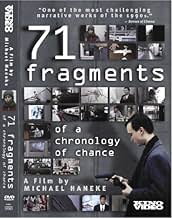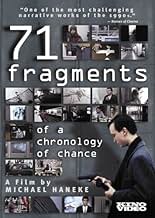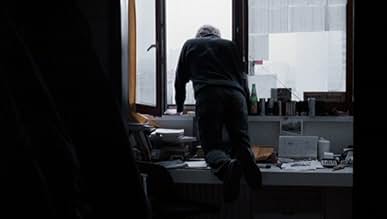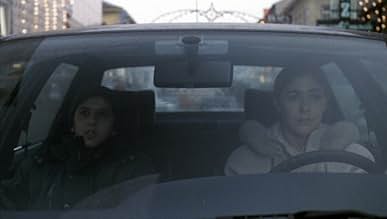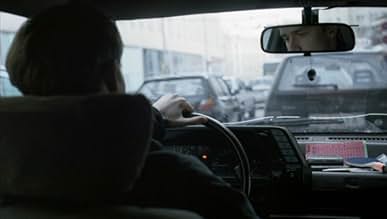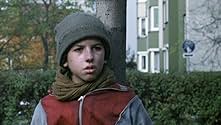71 Fragments of a Chronology of Chance
Original title: 71 Fragmente einer Chronologie des Zufalls
IMDb RATING
7.1/10
9.3K
YOUR RATING
71 scenes revolving around a recent immigrant, a couple that has just adopted a daughter, a college student and a lonely old man.71 scenes revolving around a recent immigrant, a couple that has just adopted a daughter, a college student and a lonely old man.71 scenes revolving around a recent immigrant, a couple that has just adopted a daughter, a college student and a lonely old man.
- Awards
- 4 wins & 1 nomination total
Michael Jackson
- Self
- (archive footage)
- (uncredited)
- Director
- Writer
- All cast & crew
- Production, box office & more at IMDbPro
Featured reviews
I must say that I really enjoyed this movie. The subtle exploration of the character in very personal en realistic scenes were executed in the perfect cinematic way (framing, staging, blocking, pacing, editing). The way Haneke used (the lack
of) cohesive plot really caught my attention and made me excited about how the story was going to unfold. Though the end was a bit unsatisfying for me. I wasn't drawn enough to the characters to experience a emotional climax through any strong perspective from a character arc. I understanded the thematic exploration but found the climax a bit underwhelming. I'll defintely rewatch to get a hold of more missed details which might immerse me more than my first viewing.
If you're looking for something happy, uplifting, and fun then steer clear of this movie. If you're looking for something easy and simple then steer clear of this movie. If you're looking for something that you can watch with half a brain then avoid this movie like the plague. 71 Fragments of a Chronology of Chance is an experimental film from visionary mastermind Michael Haneke. The film is 71 different scenes that highlight small tidbits of the lives a seemingly random collection of people. News clips of war and Michael Jackson are spliced into the film as well, creating a disjointed and difficult narrative that in some ways all ties together, but in other ways stays loose and frivolous. The interpretation of this kind of narrative style is at the viewers discretion.
If you're at all familiar with Haneke's work then you'll know not to expect anything straightforward going into this film. If you go into this film knowing nothing about Haneke then may God have mercy on your soul. Not really, just be prepared. This is not an easy film to follow being that there seems to not be much to follow. The majority of the film spends its time laying down the various puzzle pieces with very little rhyme or reason to the distribution of the pieces. Towards the end of the film the pieces begin coming together for a fairly anticlimactic ending that reflects the perpetual sadness of a world full of violence, hardship, neglect, and hatred. You'll never miss Haneke's macabre cynicism in any of this films, and especially not this one.
It's difficult for me to form a steadfast opinion on this film because it is so out there and so difficult to fully comprehend. As always, I respect Michael Haneke for the being the true genius he is. He's created something wholly original and intuitive here, I just can't quite place what it is. There are a lot of lines going in different directions here and they never seem quite seem to meet up. This film challenges the ideas of your typical film narrative and I have to give it kudos for taking such risks and ending up with something that works more or less. 71 Fragments of a Chronology of Chance isn't a film you just watch, it's something you experience.
If you're at all familiar with Haneke's work then you'll know not to expect anything straightforward going into this film. If you go into this film knowing nothing about Haneke then may God have mercy on your soul. Not really, just be prepared. This is not an easy film to follow being that there seems to not be much to follow. The majority of the film spends its time laying down the various puzzle pieces with very little rhyme or reason to the distribution of the pieces. Towards the end of the film the pieces begin coming together for a fairly anticlimactic ending that reflects the perpetual sadness of a world full of violence, hardship, neglect, and hatred. You'll never miss Haneke's macabre cynicism in any of this films, and especially not this one.
It's difficult for me to form a steadfast opinion on this film because it is so out there and so difficult to fully comprehend. As always, I respect Michael Haneke for the being the true genius he is. He's created something wholly original and intuitive here, I just can't quite place what it is. There are a lot of lines going in different directions here and they never seem quite seem to meet up. This film challenges the ideas of your typical film narrative and I have to give it kudos for taking such risks and ending up with something that works more or less. 71 Fragments of a Chronology of Chance isn't a film you just watch, it's something you experience.
After watching Der Siebente Kontinent and Benny's Video in rather rapid succession, it took me an inexplicably long time to get around to this, the third in Michael Haneke's Glaciation Trilogy, the director's exploration of isolation and alienation in modern society.
Following the unrelated stories of an array of everyday Austrians, 71 Fragmente einer Chronologie des Zufalls explores the weeks immediately before a bank shooting that leaves four, including the gunman, dead.
A written introduction tells us the eventual outcome of the film's events, leading us immediately to conclude that the climactic crescendo to which we will build is not so much the film's subject as a means by which to explain it. What follows is a ninety minute procession of apparently unrelated stories unfolding before us, detailing the lives of everyday people. From a lonely old man to a couple fostering an aloof child, a border hopping street urchin to an austere and religious security guard and his wife, the film covers many lives and relationships. The transitions between these are marked by a black screen, with occasional footage of news stories interjected throughout. These show us the chaos and anarchy of the characters' world, bitesize glimpses into everyday horrors. Perhaps the only discernible thing connecting them is the mire of insanity which occupies their television screens, something best remembered for later. Each miniature story is compelling and interesting, a fine achievement given the limited screen time each gets with such an array of characters to be explored. Some, of course, engender more interest than others, the old man and student characters two which I found myself particularly drawn to. Haneke, unsurprisingly, constructs long and unconventional shots, beautiful in their individuality. An early morning ritual scene recalls Der Siebente Kontinent, the camera's focus on actions rather than faces an important technique in establishing the life of this particular family. A long and winding scene featuring the elderly man on the phone to his daughter is, though entirely banal and mundane, one of the film's strongest moments, its ability to so simply yet comprehensively detail a character quite wonderful. Though one might argue that the film appears to go in no clear direction for most of its running time, this is a clear part of its slowly unfolding eventual plan. It is only in the last ten minutes of the film that we see anything more than a fly-on-the-wall documentary of regular lives and are introduced to the film's true message: one that is impactful, subtle, and the perfect finale for a trilogy that delightfully explores its chosen theme.
Creating portraits of a wide number of characters, each more intimate than many films' main characters, 71 Fragmente einer Chronologie des Zufalls is a very fine final act in a very fine trilogy. Just as subtle, removed, and non-judgmental as its predecessors, this is a comprehensive and thought-provoking social commentary which will doubtlessly benefit from multiple viewings, perhaps even more so than its cinematic siblings.
Following the unrelated stories of an array of everyday Austrians, 71 Fragmente einer Chronologie des Zufalls explores the weeks immediately before a bank shooting that leaves four, including the gunman, dead.
A written introduction tells us the eventual outcome of the film's events, leading us immediately to conclude that the climactic crescendo to which we will build is not so much the film's subject as a means by which to explain it. What follows is a ninety minute procession of apparently unrelated stories unfolding before us, detailing the lives of everyday people. From a lonely old man to a couple fostering an aloof child, a border hopping street urchin to an austere and religious security guard and his wife, the film covers many lives and relationships. The transitions between these are marked by a black screen, with occasional footage of news stories interjected throughout. These show us the chaos and anarchy of the characters' world, bitesize glimpses into everyday horrors. Perhaps the only discernible thing connecting them is the mire of insanity which occupies their television screens, something best remembered for later. Each miniature story is compelling and interesting, a fine achievement given the limited screen time each gets with such an array of characters to be explored. Some, of course, engender more interest than others, the old man and student characters two which I found myself particularly drawn to. Haneke, unsurprisingly, constructs long and unconventional shots, beautiful in their individuality. An early morning ritual scene recalls Der Siebente Kontinent, the camera's focus on actions rather than faces an important technique in establishing the life of this particular family. A long and winding scene featuring the elderly man on the phone to his daughter is, though entirely banal and mundane, one of the film's strongest moments, its ability to so simply yet comprehensively detail a character quite wonderful. Though one might argue that the film appears to go in no clear direction for most of its running time, this is a clear part of its slowly unfolding eventual plan. It is only in the last ten minutes of the film that we see anything more than a fly-on-the-wall documentary of regular lives and are introduced to the film's true message: one that is impactful, subtle, and the perfect finale for a trilogy that delightfully explores its chosen theme.
Creating portraits of a wide number of characters, each more intimate than many films' main characters, 71 Fragmente einer Chronologie des Zufalls is a very fine final act in a very fine trilogy. Just as subtle, removed, and non-judgmental as its predecessors, this is a comprehensive and thought-provoking social commentary which will doubtlessly benefit from multiple viewings, perhaps even more so than its cinematic siblings.
A fine movie that explores the lives of many strangers in Austria that are connected by the same thing: all their lives are pointless and meaningless. Though the pace is slow all the scenes work to the conclusion that is the only solution to break the deadlock. A thought-provoking film.
A Sample film in 90's about violence and how it improves. Pazzle-like narration with 71 episodes, shows us a story about the history of violence. "71 Fragmente einer Chronologie des Zufalls" has all the signs of a film which could be made in 90's. Haneke is one of the contemporary filmmaker who use the violence scenes to show us how this huge question (why violence?) has no straight answer. 71... is almost look like another haneke's famous film (Code unknown,2000) which both of them are narrating unfinished stories of some journeys. Unexpected final scenes and also, unexpected shocking shots are two icons in this film like another Haneke's films. Haneke's style is like the way Robert bresson made films. Bresson's cinematograph and also Hitchcock's suspense are affected in his cinema. His cinema invites us to watch untold stories about complicated questions of contemporary world.
Did you know
- TriviaFilm debut of Sebastian Stan.
- GoofsWhen Tomek (Otto Grünmandl) makes himself dinner, around the 20 minutes mark, there's a mirror in the background that reflects the boom mic.
- ConnectionsFeatured in Mein Leben: Michael Haneke (2009)
- How long is 71 Fragments of a Chronology of Chance?Powered by Alexa
Details
- Release date
- Countries of origin
- Languages
- Also known as
- 71 фрагмент хронології випадковостей
- Filming locations
- Production companies
- See more company credits at IMDbPro
- Runtime
- 1h 40m(100 min)
- Color
- Aspect ratio
- 1.66 : 1
Contribute to this page
Suggest an edit or add missing content

